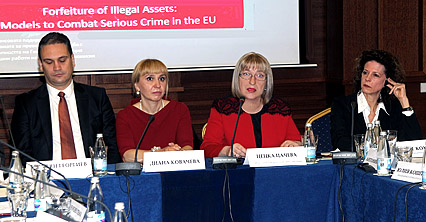
The state should demonstrate that it is stronger than the criminals. Bulgaria is among the EU member states having most up to date legislation for withdrawal of illegally acquired assets. Bulgarian legislation foresees forfeiture of any asset the legal origins of which can’t be proven, the Chair of the National Assembly Tsetska Tsacheva stated at the opening of the International Conference titled: " Forfeiture of assets by the state: models for fighting crime in the European Union". The event was organized by the Transparency without Borders Association on 28 April 2015.
The Speaker of the Parliament underscored that the theme of the conference was important for Bulgaria, as well as for the EU. Tsetska Tsacheva cited Europol’s data, showing that there are 3600 organized crime groups operating on the territory of the EU. The assets of these crime groups amount to around 110 billion euro. The number illustrates the great threat that those groups represent for Europe and the need to counter their activities by all possible means.
The legislation of the EU Member States shows that the efforts are directed at not allowing the illegal assets to overtake the economy and to not allow the heavy offenders to benefit from their illegal activities and draw economic advantages, said the head of the National Assembly.
The Head of the Managing Board of Transparency without Borders Association, Ognyan Minchev, and the representative of the Berlin’s office of Transparency International Secretariat, Anne Koch, as well as Plamen Georgiev, Chairman of the Commission for Withdrawal of Illegal Assets in Bulgaria attended the conference.
Associate Professor, Dr. Antoniy Galabov, presented before the audience a comparative study on the different models for seizure of assets in Bulgaria, Italy and Romania. Representatives of Transparency International from Great Britain, Italy, the Netherlands and Romania talked about the ways of property confiscation/forfeiture in different EU member states.

- 22/04/2021
The Parliament imposed a moratorium on concessions, real estate deals and appointments pending the election of a new cabinet or caretaker government - 16/04/2021
By 156 votes “in favour”, the National Assembly accepted the resignation of the Council of Ministers with Prime Minister Boyko Borisov - 15/04/2021
Speech by Mrs. Iva Miteva upon her election as a President of the 45th National Assembly - 15/04/2021
The Member of Parliament Iva Miteva was elected President of the 45th National Assembly - 15/04/2021
The Members of the 45th National Assembly were officially sworn in - 03/03/2021
The President of the National Assembly Tsveta Karayancheva and MPs attended the solemn fireworks-retreat on the occasion of the Liberation of Bulgaria - 03/03/2021
Every Bulgarian should preserve and honour the memory of those glorious ancestors, thanks to whom Bulgaria exists today, said the President of the National Assembly Tsveta Karayancheva in Gabrovo - 03/03/2021
Today we are on Shipka to pay our respects to all the heroes who sacrificed their lives for freedom, said the President of the National Assembly Tsveta Karayancheva after climbing Shipka Peak together with young people from all over the country - 02/03/2021
The Vice-President of the National Assembly Valeri Simeonov received an award from the Bulgarian Republican Self-Government in Hungary - 26/02/2021
The Parliament adopted at second reading amendments to the Measures Against Money Laundering Act
 Български
Български English
English